Mörön
Mörön (Mongolian: Мөрөн;ᠮᠥᠷᠡᠨ, lit. 'river'), also spelled Murun, is the administrative center of Khövsgöl Aimag (province) in northern Mongolia. Before 1933, Khatgal had been the aimag capital.
Mörön Мөрөн ᠮᠥᠷᠡᠨ | |
|---|---|
| Mörön District Мөрөн сум ᠮᠥᠷᠡᠨᠰᠤᠮᠤ | |
 Mörön from south, July 2008 | |
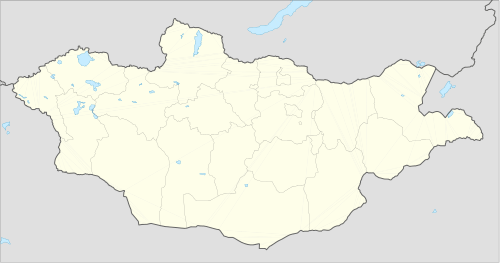 Mörön Location in Mongolia | |
| Coordinates: 49°38′08″N 100°09′20″E | |
| Country | |
| Province | Khövsgöl |
| Settled | 1809 |
| Area | |
| • District | 102.9 km2 (39.7 sq mi) |
| • Urban | 16.04 km2 (6.19 sq mi) |
| Elevation | 1,710 m (5,610 ft) |
| Population (2017) | |
| • District | 39,404 |
| • Density | 380/km2 (990/sq mi) |
| Time zone | UTC+8 |
| Postal code | 210 xxx |
| Area code(s) | +976 (0)138 |
| License plate | ХӨ (_ variable) |
Although a poorly developed town, Mörön has a hospital, a museum, a theatre, a post office, and several schools and kindergartens. It was connected to the Mongolian central power grid in 2004. The town has had a paved road connecting it to Mongolia's capital city Ulaanbaatar since December 2014, as a part of a government effort to extend paved roads from Ulaanbaatar to all Aimag capitals.[1]
History
The settlement stems from the Möröngiin Khuree monastery, which had been founded in 1809/11 on the banks of the Delgermörön river. By the beginning of the 20th century, the monastery had grown to a population of about 1300 lamas, but was destroyed in 1937. A small new monastery (Danzadarjaa Khiid) was erected on the western edge of the town in the 1990s.
The town was notably featured in a 2019 episode of The Grand Tour, where Jeremy Clarkson, Richard Hammond and James May travel from western Mongolia in a hand-built kit car to reach the city in the span of seven days.
Population
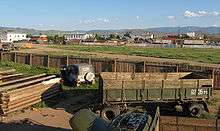
| 1959 est. |
1969 census |
1979 census |
1989 census |
1994 est. |
2000 census |
2005 est. |
2007 est. |
2010 census |
|---|---|---|---|---|---|---|---|---|
| 9,000 | 11,200 | 16,500 | 21,300 | 27,230 | 28,147 | 35,872 | 36,082 | 35,789 |
Most of the inhabitants live in ger districts.
Airport
The Mörön Airport (ICAO: ZMMN, IATA: MXV) has two runways, one paved and one gravel. It is served by regular flights from and to Ulaanbaatar. Some flights to the western Aimags may stop over.
Climate
Mörön experienced a continental semi-arid climate (Köppen BSk) with a subarctic temperature regime (Dwc) based upon the 1961 to 1990 reference period resulting in long, very dry, frigid winters and short, warm summers. Just a 0.3 °C (0.5 °F) rise of May temperatures would render the climate to have a warm-summer continental temperature profile (Dwb), and given the mildness of northern latitudes in recent decades, the regime is likely to be so if newer averages were used.
| Climate data for Mörön | |||||||||||||
|---|---|---|---|---|---|---|---|---|---|---|---|---|---|
| Month | Jan | Feb | Mar | Apr | May | Jun | Jul | Aug | Sep | Oct | Nov | Dec | Year |
| Record high °C (°F) | 4.5 (40.1) |
9.2 (48.6) |
18.7 (65.7) |
27.1 (80.8) |
32.5 (90.5) |
35.4 (95.7) |
33.9 (93.0) |
33.0 (91.4) |
28.8 (83.8) |
23.6 (74.5) |
10.7 (51.3) |
9.6 (49.3) |
35.4 (95.7) |
| Average high °C (°F) | −14.5 (5.9) |
−9.3 (15.3) |
0.8 (33.4) |
9.9 (49.8) |
18.2 (64.8) |
22.9 (73.2) |
23.4 (74.1) |
21.9 (71.4) |
16.7 (62.1) |
7.6 (45.7) |
−3.7 (25.3) |
−12.1 (10.2) |
6.8 (44.3) |
| Daily mean °C (°F) | −22.7 (−8.9) |
−18.3 (−0.9) |
−8.0 (17.6) |
1.4 (34.5) |
9.7 (49.5) |
15.2 (59.4) |
16.2 (61.2) |
14.4 (57.9) |
7.9 (46.2) |
−0.7 (30.7) |
−11.4 (11.5) |
−19.8 (−3.6) |
−1.3 (29.6) |
| Average low °C (°F) | −28.8 (−19.8) |
−25.8 (−14.4) |
−15.9 (3.4) |
−6.4 (20.5) |
1.2 (34.2) |
7.5 (45.5) |
10.1 (50.2) |
7.6 (45.7) |
0.4 (32.7) |
−8.0 (17.6) |
−18.0 (−0.4) |
−25.6 (−14.1) |
−8.5 (16.8) |
| Record low °C (°F) | −45.7 (−50.3) |
−44.3 (−47.7) |
−34.6 (−30.3) |
−22.3 (−8.1) |
−11.7 (10.9) |
−5.8 (21.6) |
1.4 (34.5) |
−1.6 (29.1) |
−12.7 (9.1) |
−27.3 (−17.1) |
−37.9 (−36.2) |
−45.8 (−50.4) |
−45.8 (−50.4) |
| Average precipitation mm (inches) | 1.3 (0.05) |
1.0 (0.04) |
0.8 (0.03) |
7.0 (0.28) |
15.3 (0.60) |
42.6 (1.68) |
59.6 (2.35) |
54.1 (2.13) |
17.5 (0.69) |
5.3 (0.21) |
1.9 (0.07) |
1.4 (0.06) |
207.8 (8.19) |
| Average precipitation days (≥ 1.0 mm) | 0.5 | 0.5 | 0.5 | 1.4 | 2.9 | 6.8 | 10.2 | 8.0 | 3.7 | 1.3 | 0.3 | 0.4 | 36.5 |
| Mean monthly sunshine hours | 168.4 | 199.0 | 252.6 | 250.0 | 294.5 | 291.5 | 274.3 | 274.1 | 249.0 | 224.9 | 168.1 | 154.5 | 2,800.9 |
| Source: NOAA (1961-1990)[9] | |||||||||||||
Notable buildings
- There were 60 temples and monasteries in Mörön at the end of the 19th century. Möröngiin Chüree Khiid Monastery in which about 2500 monks were living was the most important one. It was famous for its Tsam dances. In 1937, however, the monasteries and temples of Mörön were all destroyed by order of the then president Khorloogiin Choibalsan, like everywhere in Mongolia. Danzadardscha Khiid, a small new monastery, was built in a traditional style in the western part of Mörön in June 1990, and 40 monks are living there.[10] Several stupas and a tall Buddha statue were built around it as well.
- The municipal theatre and the post office are on the southern and southwestern edges of the large Central Square. Opposite, the Town Hall which was built in a typical socialist style, is worth a look as well. In the middle of the square, an equestrian statue was erected as a monument for Chingunjav, the leader of a local rebellion against the Qing dynasty, in 2010. This statue replaced an older monument for Davaadorj (see below).
- The monument for Davaadorj, a Mongolian border guard from Khövsgöl who was killed in a skirmish on the Khovd/Xinjiang border in 1948, has been moved to the compound of the border troops, around 300 m northeast of the Central Square.
- Another sightworthy memorial was erected in front of the airport: Khainzangiin Gelenkhüü (Хайнзангийн Гэлэнхүү; 1870–1938), a Buddhist monk who tried to fly with wings made of sheep leather near the town of Jargalant in the 1930s.[11]
- The Aimag Museum, founded in 1949, is half-way between the Central Square and the Wrestlers' Stadium. It shows about 4000 objects, e.g., are traditional clothes and other items of minorities living in Khövsgöl Aimag.[12]
- The Wrestlers' Stadium is an interesting modern building in the eastern part of the town. In front of it, a memorial was erected to honour three famous wrestlers stemming from Mörön. A special park for children was laid out opposite the stadium.
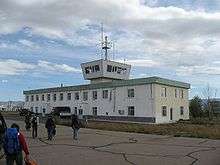 Airport
Airport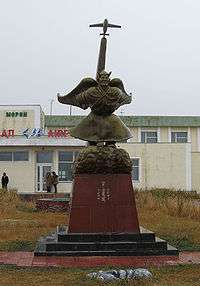 Gelenkhüü Memorial in front of the airport
Gelenkhüü Memorial in front of the airport Central Square with Chingunjav Memorial
Central Square with Chingunjav Memorial Museum
Museum Town Hall
Town Hall Post Office
Post Office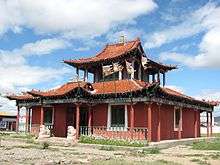 Danzadardscha Khiid Monastery
Danzadardscha Khiid Monastery Buddha statue at the monastery
Buddha statue at the monastery Wrestlers' Stadium
Wrestlers' Stadium Wrestlers' Memorial
Wrestlers' Memorial
References
- "Ulaanbaatar Murun Paved Road Complete". Archived from the original on 2016-03-12. Retrieved 2014-12-11.
- National Statistical Office Archived 2007-06-07 at the Wayback Machine
- National Economy of the Mongolian People's Republic (1921 - 1981), Ulaanbaatar 1981
- GeoHive: Global Statistics Archived 2013-07-30 at the Wayback Machine
- "Population Statistics: historical demography". Archived from the original on 2015-02-23. Retrieved 2007-06-29.
- M. Nyamaa, Khövsgöl aimgiin lavlakh toli, Ulaanbaatar 2001,passim
- Rural Poverty Reduction Programme: official site Archived 2007-09-28 at the Wayback Machine
- Khövsgöl Aimag Statistical Yearbook 2007
- "Muren Climate Normals 1961-1990". National Oceanic and Atmospheric Administration. Retrieved January 13, 2013.
- Michael Kohn: Mongolia, p. 150. London 2008.
- Michael Kohn: Mongolia, p. 163. London 2008.
- Marion Wisotzki: Mongolei, p. 232. Berlin 2010.